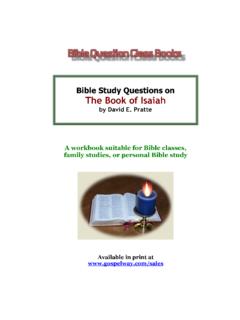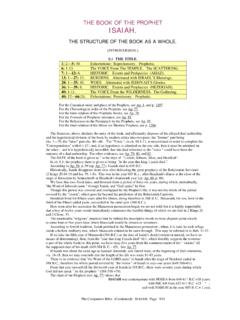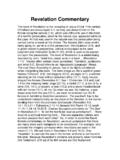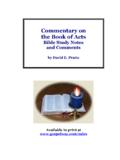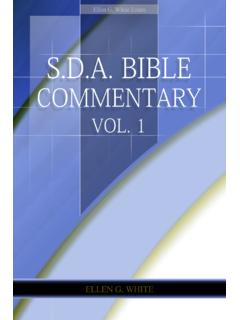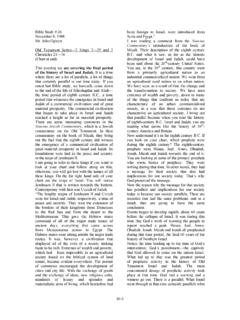Transcription of BIBLE STUDY ON THE PROPHETS - Community …
1 BIBLE STUDY ON THE PROPHETSP rophets have been concerned with fundamental changes in human society. Theyunderstood a great deal about change and they offered an alternative perception Old Testament mentions prophecy over 300 times. In its wide usage personswere called PROPHETS who communicated a divine message - Abram (Gen 20:7),Aaron (Ex. 7:1). We generally think of them receiving a call and spreading God'smessage kin an oral, dramatic, or written PROPHETS were very confronting of the king; at other times they werevery supportive.
2 Scholars suggest that the PROPHETS represented the kingship ofYahweh (God). When the earthly king operated within the divine will, the prophetwas a friendly intercessor or messenger of God to the Read Deuteronomy 18:18-22 and 1 King chapter 22. What do these passagessay about God's PROPHETS and false PROPHETS . Who are such PROPHETS today?2. Read Jeremiah l:10 and 31:27-34. Jeremiah takes place before and after Judahwas overthrown by the Babylonians in 586 How does God relates to nationsin negative and positive ways?
3 How can despair and hope relate to our nation?2. Read Micah 2:1-2; 3:1-2, 8-9; and 6:8. Looking at the notes below, pick out theverses relating to leadership, economics and the system. Do you agree withBrueggemann?(on Micah) "In biblical faith, the doing of justice is the primary expectation of God Justice is to sortout what belongs to whom, and to return it to them.. Of the indictments from Micah, we may notethree important factors. First, the poetry is addressed to the leadership .. Second, the agenda isconsistently economic Third, Micah is making a critique of the system of social control the invitation todo justice is in a context of the systemic power of evil.
4 " TO ACT JUSTLY, LOVE TENDERLY ANDWALK HUMBLY, Walter Brueggemann, BIBLE STUDY ON isaiah 40-55 Are we living in exile? Yes, suggests Walter Bruegge mann who states that"those persons, however, find out even in their power and influence howdifficult it is to act through the rhetoric and out of the claims of this theologicaltradition. Like Daniel and the exiles of ancient Israel, the powerful among usmust travel mostly incognito in the culture at large the faith claims in ourtheological tradition are increasingly at odds with dominant American values theanti-human side of American self-discernment has grown more powerful andbold.
5 We hold to an identity and a vocation, an overriding loyalty, which islargely unwelcome in our society."For Brueggemann, Neither assimilation nor despair are appropriate he calls for "fresh, imaginative theologmal work" through six disciplines ofreadiness he draws from isaiah 40-55. The six are a litany of dangers - memories,criticism, promises, song, bread, and isaiah 46:6-7, 51:1-2, and Hebrews 11:8-13. Can your faith speak ofdangerous memories and criticism within our isaiah 54:1-3 and 42:10-16. Are their dangerous promisesand songs to embrace today?
6 Read isaiah 55:1-3, 12, and 52:11-12. Is their a satisfying dangerous nouriishingbread for you? (see Exodus 16) Should we depart from the American empire? (seenote below)"We reflect upon a departure from the ideology of the empire, from militarism which produces fear,from consumerism which ends in satiated despair, from greed which breeds brutality, from ambitionwhich ends in isolation, from competence which begets anxiety .."Such newness of people, Community and creation is God's gift which God may give or withhold.
7 Wecan only stand in readiness for what God may do But that standing in readiness requires the useintentional disciplines which in every case are marked by danger: dangerous memories reaching allthe way back to our barren mother Sarah; dangerous criticism whichmocks the deadly empire; dangerous promises which imagine a shift Of power in the world; dangeroussongs which sing of unexpected newness of life; dangerous bread free of all imperial ovens; all leadingto dangerous departures of heart and body and mind, leavings undertaken in trust and obedience.
8 Thegospel, in our moment of exhaustion, is a caring promise and a wondrous assertion that we belong andare intensely cared for." (Is:43:1-2) (See Brueggemann's isaiah commentary)A BIBLE STUDY ON JEREMIAH Jeremiah lived during the time of the fall of Jerusalem (597 and 586 ).Israel was idolatrous and sinful. The nation did not repent so God raised up his"servant" Nebuchadnezzasr to "destroy them and make them a horror, a hissing,and an everlastingdesolations." (Jer 25:9).
9 The book of Jeremiah is not only about Judah but is also about Jeremiah feared for his life, even in his hometown Anathoth (11:18f). Jeremiah feltgreat anger and grief about his land and his nation. He had to withdraw support forhis nation; even God directed him to stop praying for the people (7:16, 11:14)!Walter Brueggemann traces traces three aspects of the theological tradition foundin Jeremeiah: "Israel's covenant with Yahweh, rooted in the memories andmandates of the Sinai tradion; the pathos of Yahweh; and the royal-templeideology of Read Jeremiah 7:6-9; 11:9-13 and 7:4.
10 What were the sins of Judah? Were theyhiding behind the royal-temple ideology (v. 4)? (see note below)2. Read Jeremiah 11:1-8. What is the covenant? When it says "command" (v. 4)and "obey" (v. 7), do you accept the covenant requiring obedience?3. Read Jeremiah 11:14-23; 12:7-13. Do you believe God will do something likethis today? Do you sense anger and grief about our nation? About God?"Indeed, that Jeremiah's contemporaries could not discern the relation between imperialpolitics and covenantal theology is a central issue of the book.
![[A Work in Progress] - Bible Professor](/cache/preview/e/e/3/3/2/d/c/f/thumb-ee332dcf388452f3fc2160af1dec50c3.jpg)
